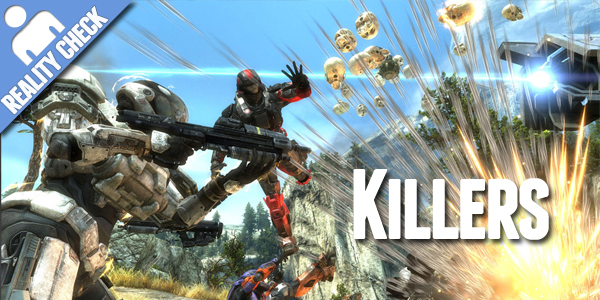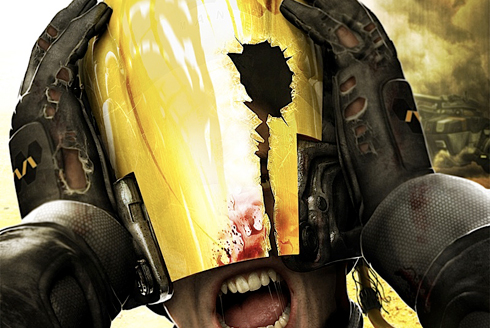
Indie Jones and the Latest Crusade.
The games industry is obsessed with death: not just the satisfying pop when an alien’s head explodes like a burst watermelon, but games killing other games as well. Writers used to describe every new shooter as a ‘Halo killer’, forgetting that murdering the emotional attachment between player and game is easier said than done. This didn’t stop Sony from bragging about how Killzone would take Halo… well, into the kill zone.
Publishers talk trash to keep the game hype machine rolling from the moment of inception to the Christmas retail showdown. Game rivalries become established, yet they are far from the zero sum death matches their promoters portray. What would it look like if games actually fought each other? Battlefield taking a set of keys to the back of Call of Duty‘s disc, their boxes flapping violently against each other. An Xbox stealthy wrapping a PS3 in a blanket while it’s playing a Blu-Ray and pouring custard into its vents.
This endless competition, this ‘1up-manship’, is futile. Not every game can be a commercial success, but last year showed there was room for both Battlefield and Call of Duty. Like David Mitchell’s brilliant parody of British TV football coverage, these struggles are monumentally anticlimactic. Call of Duty and FIFA are so popular that they exist beyond the gladiatorial arena. Playing Call of Duty is more like watching a soap opera or televised football: it becomes a small part of a regular routine, while Batman: Arkham City is a more concentrated investment over a relatively shorter time. People don’t watch other TV shows instead of Eastenders: they watch them in addition to Eastenders.
In promoting your product in direct opposition to these behemoths, you are dooming yourself to failure. By lining up Call of Duty in your sights, you can’t help but look second best. We get tragedies like Free Radical’s Haze, where the rubbish quality of the final product is farcical when compounded with the hype . It lifts our expectations to unrealistic levels. Good games speak for themselves: they don’t need spokespeople proclaiming their superiority. The original Modern Warfare didn’t overtake Halo 3 in popularity through sheer bravado; it simply delivered the goods.
Indie games have largely sidestepped the PR fracas, with Minecraft and Fez gaining popularity through word of mouth rather than advertising. Humble Bundles have snowballed in popularity, so it’s only natural that big publishers would get in on the action too: EA released an ‘indie’ bundle this week, which reaches “Jeremy Irons drinking Irn-Bru while dressed as Iron Man” on my Scale of Irony.
It didn’t take long for Mojang’s Markus Persson, aka Notch, to decry EA’s marketing and complain that they were ‘killing the games industry’. Notch complaining about something isn’t exactly newsworthy: he just seems to get away with it more than other people. How exactly are EA killing the games industry by promoting it? The games in their bundle are published by EA without dictatorial control. Surely that’s a good thing?



How can EA kill a company like Mojang, a powerful example of how development studios can succeed outside the traditional retail model? Although I’m not a fan of EA’s insistence on insidious downloadable content and online passes, we are not forced to buy their games. Despite the pointless “me too”-ness of Origin, I wouldn’t want to be in a world where Steam was the only online retailer. Ultimately, you have to vote with your wallet: I buy what I’m interested in, and that includes EA games like Mirror’s Edge, but not Battlefield 3: Grey Guns and Brown Buildings or The Sims 3: Windowsills and Mullions Pack.
Indie developers are like Anonymous: they are indefatigable (or should that be ’indiefatigable’?). You can’t stop something that can publish anywhere and is self-funded. Unlike big publishers, indies are fast and nimble. They can create games on a shoestring budget and survive on smaller sales. They can be funded on Kickstarter or a lone coder can create a game in their spare time. This isn’t a David vs Goliath battle: it’s more like a Ferrari vs a steamroller.
When companies like Maxis and BioWare are swallowed up by EA, game fans complain like they are bands ‘selling out’. If EA are Universal Music, then EA Partners are Def Jam and Mojang a defiant Epitaph. All of these companies want to make money and success is often a corrupting factor: it’s not that long since EA were the rebellious upstarts circumventing Sega’s licensing and reverse-engineering the Mega Drive. An altrustic ideology will only get you so far: look at Google. I hope Mojang don’t end up the same way.
If anything, it is the blockbuster ‘AAA’ model that will die as development costs continue to increase inexorably, replaced by indie developers and even individual programmers. The message of Anna Anthropy’s book ‘Rise of the Videogame Zinesters‘ is that bedroom programming and game development, especially of individually expressive ‘art games’, is destined to increase. Anyone can make a game, and everyone who can should. (I haven’t read the book as there seems to be no legitimate way to obtain a digital copy in the UK, so read this review. Gift copies gladly accepted.)
There is a presumption that you can learn to program, but no more so than the presumption that a writer can type words into a text editor. I don’t agree entirely with Anthropy: game making, like writing or any other talent, is not something everyone can do or something they should do. I can’t paint or sing: these are things I should be barred from practising. It’s a public safety issue, really. Perhaps the take home message from Anthropy’s book should be ”discover your niche and express yourself”, unless that expression is a genre of music I don’t like, of course.
The mainstream media have, as is now inevitable whenever an act of violence occurs, drawn a correlation between Anders Behring Breivik and gaming because he has played Call of Duty. Given the popularity of that game, this is about as meaningful as making a connection with him breathing oxygen. Yet maybe it’s no wonder the media associate video games with killing when we’re obsessed with killing each other, both in the game and out of it.
When publishers use the language of combat so openly to describe a mere sales contest, it inevitably bleeds into a wider context. Maybe this time might be better spent on actually making the games, rather than boasting about their retail slaying prowess. Like a skilled Civilization player, it’s possible to win through construction and development as well as outright conquest. Some people just like to start a war.
The best of gaming opinion, editorial and iconoclasm every week on Split Screen: it’s Reality Check.





